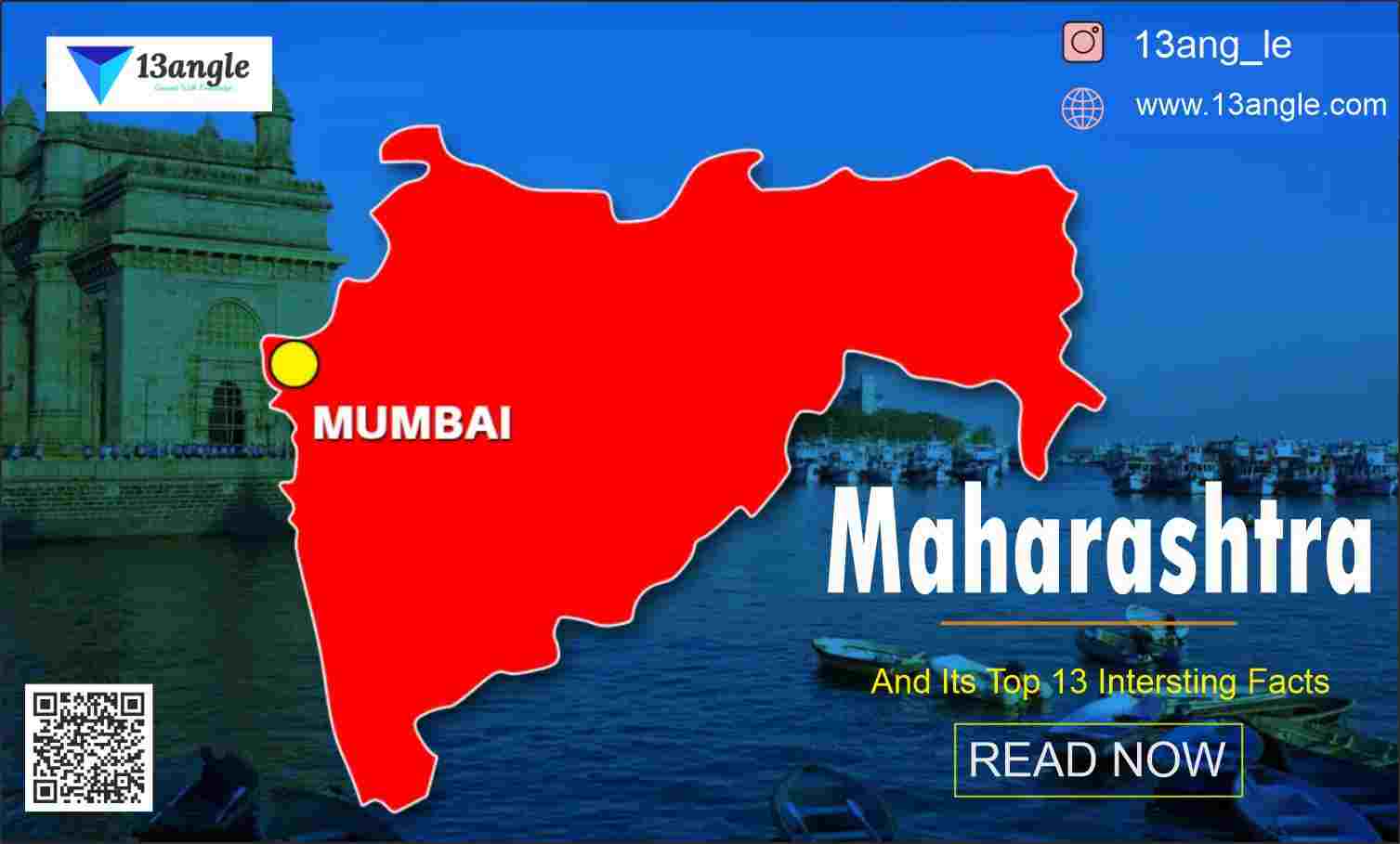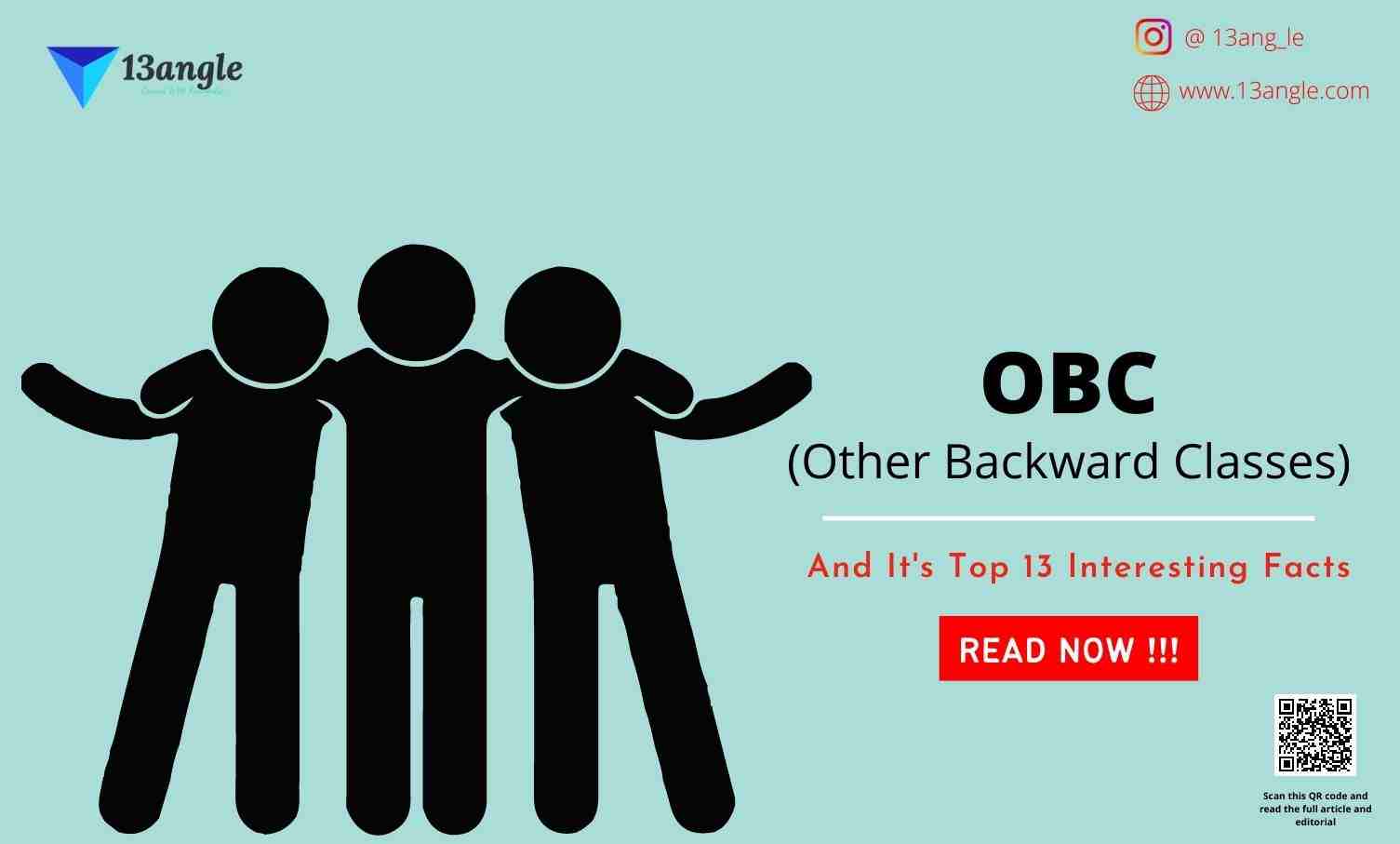
The Article 370 provision was introduced in India under Part XXI of the Constitution of India on October 17, 1949, and was initially put under the heading of “Temporary and Transitional Provisions.” This exempts Jammu and Kashmir from the Indian Constitution and allows it to draft its own Constitution and restricting the Indian Parliament’s legislative powers in the state.
However, the title of Part XXI of the Constitution was changed to ‘Temporary, Transitional and Special Provisions’ through the Thirteenth Amendment Act of 1962. The whole article was interpreted and considered Article 370 as a special provision for the state of Jammu & Kashmir which dominated the deliberation of the people.
This imaginative interpretation of Article 370 considered it as a ‘special provision’ hence ‘permanent’. It misled readers into believing that the status of Article 370 is of a ‘special provision’ rather than a ‘temporary’ one.
Article 370 represents a compact between the state of J&K and the Union of India, but as it was a temporary arrangement between the two, the entire Princely state of J&K is considered an integral part of India.
Article 370 of the Indian constitution provided that only Articles 1 and 370 themselves would apply to J&K. the application of other Articles was to be determined by the President in consultation with the government of the state. Other provisions of the Constitution would apply with exceptions and modifications specified by the President in his Order in consultation with the government of the state.
The Constitution Order of 1950 specified the matters on which the Union Parliament would be competent to make laws for J&K, in concurrence with the Instrument of Accession – 38 subjects from the union list were added.
For extending a central law on citizens included in the Instrument of Accession (IoA), mere “consultation” with the state government is needed. But for extending it to other matters, “concurrence” of the state government is mandatory.
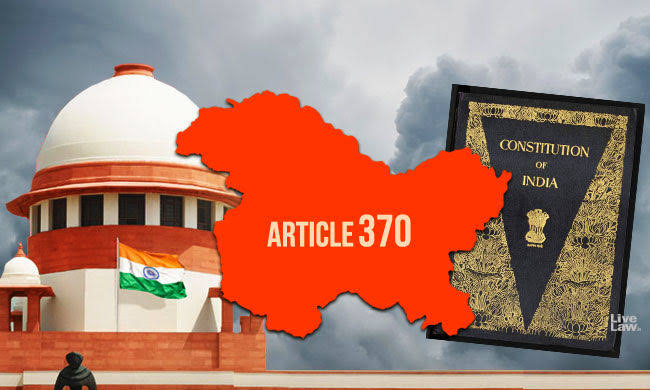
Article 35A
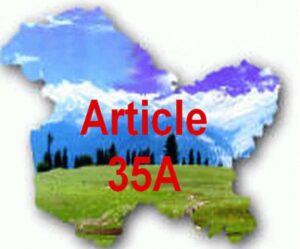
Article 35A of the Indian constitution is a provision that allows the Jammu and Kashmir assembly to define who is a permanent resident of the state. It is a privilege that is not enjoyed by any other state in India.
Only the Jammu and Kashmir assembly can change the definition of a (PR) permanent resident through a long ratified by a two-thirds majority and the special status that allows this provision was brought in by presidential order in 1954. The order came almost 7 years after Jammu and Kashmir acceded to India.
Article 35A says that all laws which apply to India will not be applicable to Jammu and Kashmir, and the President with the consultation of the State assembly will decide which laws will be applicable to Jammu and Kashmir. Further, Article 35A declares that which people are declared or decided to be permanent residents of Jammu and Kashmir and give them special rights in government jobs, on buying property in the state, scholarships, and other schemes.
To be a permanent resident, one must be “persons born or settled within the state before 1911 and was a state subject as of May 14, 1954, or after having lawfully acquired immovable property and is a resident in the state for not less than 10 years before that date.”
=> The text of article 35A states as follows :
“Saving of laws with respect to permanent residents and their rights. — Notwithstanding anything contained in this Constitution, no existing law in force in the State of Jammu and Kashmir, and no law hereafter enacted by the Legislature of the State:
(a) Defining the classes of persons who are, or shall be, permanent residents of the State of Jammu and Kashmir; or
(b) Conferring on such permanent residents any special rights and privileges or imposing upon other persons any restrictions as respects—
- Employment under the State Government;
- Acquisition of immovable property in the State;
- Settlement in the State; or
- Right to scholarships and such other forms of aid as the State
The government may provide, shall be void on the ground that it is inconsistent with or takes away or abridges any rights conferred on the other citizens of India by any provision of this part.”
- There were many disadvantages for the non-permanent residents of Kashmir namely-
- No person who is not a Permanent Resident of Jammu and Kashmir can own property in Jammu and Kashmir.
- No person who is not a Permanent Resident of Jammu and Kashmir can obtain a job within Jammu and Kashmir Government.
- No person who is not a Permanent Resident of Jammu and Kashmir can join any professional college run by the government of Jammu and Kashmir or get any form of government aid out of government funds.
History
Before 1947
Before British India gained independence in 1947 and was partitioned into two different dominion regions namely India and Pakistan, the state of Jammu and Kashmir was part of the 565 princely states that were not under the direct control of the British colonial administration states and had a hold on a great degree of autonomy to manage their own affairs (except in the area of defense and foreign relations).
The IoA came into play when the Indian Independence Act, 1947 divided British India into India and Pakistan. The Act provided for three options: to remain an independent country, join Dominion of India, or join Dominion of Pakistan — and this joining with either of the two countries was to be through an IoA.
All the Princely states except Jammu and Kashmir, Hyderabad, and Junagadh recognized India or Pakistan as their country by August 15, 1947. Maharaja Hari Singh the ruler of J&K delayed his decision as it was for him not easy, his state was sharing a border to both dominions and while he was a Hindu his subjects were predominantly Muslim.
Maharaja Hari Singh declared that he would stay independent and the Muslims in a majority in J&K Pakistan expected its accession.

- However, after an uprising against the ruler in Poonch and an invasion by a Pathan tribal militaries from Pakistan, Maharaja Singh decided to turn to India for military assistance. But India insisted on the accession before sending its troops. Hence Maharaja Hari Singh’s signed the IoA on October 26, 1947, and had brought Jammu and Kashmir into India, and its terms restricted New Delhi’s jurisdiction over Jammu and Kashmir in the matters of foreign affairs, defense, currency, and communication. Clause 7 of the Instrument of Accession signed by Maharaja Hari Singh declared that the State could not be compelled to accept any future Constitution of India.
After 1947
This IoA was later inserted into India’s constitution as Article 370 on October 17, 1949, but the autonomy agreed upon in the latter was continuously eroded from the early 1953s.
In 1952, the Shyama Prasad Mookerjee-led Praja Parishad launched an agitation seeking the complete merger of Jammu and Kashmir with the Indian union. As Jammu reverberated with his popular slogan “Ek desh mein do vidhen, do-nishan, do-pardhan, nahin chalega, nahin chalega”.
Article 35A was added to the Constitution according to The Constitution Order on 14 May 1954 (it empowers the state legislature to legislate on the privileges of permanent residents with regard to immovable property, settlement in the state, and employment.) Indian citizenship and all related benefits i.e. the fundamental rights were extended to the permanent residents of Jammu and Kashmir.
However, when the State’s constituent assembly dissolved itself on 25 January 1957, it did so without recommending either the abrogation or the amendment of Article 370. Hence, the Article was considered to have become a permanent feature of the Indian constitution, and it was also confirmed by various rulings of the Supreme Court of India and the High Court of Jammu and Kashmir.
Other than these original orders, forty-seven other Presidential orders were issued between the time periods of 11 February 1956 and 19 February 1994, making various other provisions of the Constitution applicable to Jammu and Kashmir. All these orders were issued with the ‘concurrence of the Government of the State’ without any Constituent Assembly.
The Presidential Order Of 2019

Home Minister Amit Shah, on 5 August 2019, announced that the President of India had issued The Constitution Order, 2019 under Article 370, which will replace the Constitution Order, 1954. In this order, it stated that all the provisions of the Indian Constitution applied to Jammu and Kashmir.
Whereas in the order of 1954, it specified only a limited number of articles of the Indian constitution will be applied to the state, this new order removed all such restrictions. This meant that the separate order for the Constitution of Jammu and Kashmir got repelled. This order was expressed to have been issued with the “concurrence of the Government of State of Jammu and Kashmir” which means with the go-ahead of the governor who is appointed by the constitution.
The Presidential Order of 2019 also added a new clause (4) consisting of four other sub-clauses to Article 367 under the name “interpretations”.
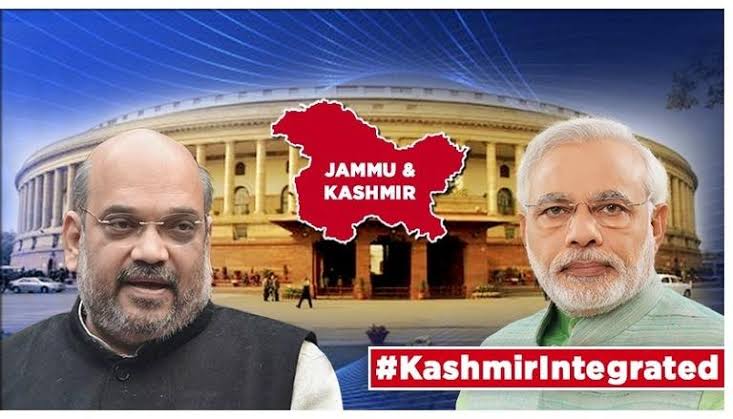
Promptly after issuing the Presidential Order in front of the Rajya Sabha, Home Minister Amit Shah stated a resolution advocating that the president issue an order under Article 370(3) making all clauses of Article 370 revoked.
After this resolution was okayed by both houses of the parliament, the president issued the Constitutional Order 273 on 6 August 2019 replacing the remaining text of Article 370 with the following text:
370-All provisions of this Constitution, as amended from time to time, without any modifications or exceptions, shall apply to the State of Jammu and Kashmir notwithstanding anything contrary contained in article 152 or article 308 or any other article of this Constitution or any other provision of the Constitution of Jammu and Kashmir or any law, document, judgment, ordinance, order, by-law, rule, regulation, notification, custom or usage having the force of law in the territory of India, or any other instrument, treaty or agreement as envisaged under article 363 or otherwise.
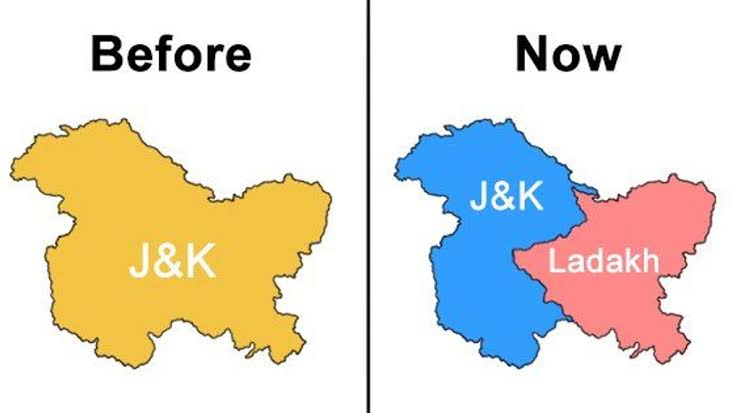
Alongside this order, on 5 August 2019, on the same date, Home Minister Amit Shah introduced the Jammu and Kashmir Reorganization Bill, to convert Jammu and Kashmir’s standing as a state into two separate union territories, namely Union Territory of Jammu and Kashmir and Union Territory of Ladakh.
The union territory of Jammu and Kashmir was proposed to have a legislature under the bill whereas the union territory of Ladakh is proposed to not have one. By the end of the day, the bill was passed by Rajya Sabha with 125 votes in its favor and 61 against (67%). The next day, the bill was passed by the Lok Sabha with 370 votes in its favor and 70 against it (84%). The bill became an Act after it was signed by the president.
These two union territories came into existence on 31 October 2019, which was celebrated as National Unity Day. The president of India appointed a Lt. Governor for the Union Territory of Jammu and Kashmir and a Lt. Governor for the Union Territory of Ladakh.
Both the Lt. Governors were sworn in by Justice Gita Mittal, the Chief Justice of Jammu and Kashmir High Court, on 31 October 2019, first at Leh for Ladakh UT and then at Srinagar for Jammu and Kashmir UT. This marked the end of Articles 370 and 35A after a long run of 70 years.
Top 13 Interesting Facts On Article 370 And 35A
Dr. BR Ambedkar, the principal drafter of the Indian Constitution, had refused to draft Article 370.
Article 370 was eventually drafted by Gopalaswami Ayyangar. Ayyangar was a minister without a portfolio in the first Union Cabinet of India. He was also a former Diwan to Maharajah Hari Singh of Jammu and Kashmir.
Jammu and Kashmir had a legislature free rein to draft its own laws, except in the areas of communications, defense, finance, and foreign affairs. It has its own constitution, flag, and penal code.
Article 370 could be abrogated or amended only upon the recommendation of the State’s Constituent Assembly.
President’s Rule under article 356 of the Constitution of India was ended in the state of Jammu and Kashmir on the night of 30 October 2019. President’s Rule is not applicable to and is not needed in a union territory as the union territory anyway is controlled by the central government.
According to Jill Cottrell, some of the Presidential orders under Article 370 have been issued since 1954 in similar circumstances when the state was under President’s rule. The Union governments interpreted the “concurrence of the state government” under these circumstances to mean the Governor.
In 1953 Sheikh Abdullah provoked rearticulated independence as one of the “Possible options’ open to the state’s people’s votes. Nehru’s government arrested Abdullah in August 1953 and sent him to Kodaikanal detention house at Tamil Nadu, in the south and eighth class passed Bakshi Ghulam Mohammad became Prime Minister of J&K.
The provisions facilitated by Article 35A and the state’s permanent resident laws have been criticized over the years for their discriminatory nature, including the hardships imposed on immigrant workers, refugees from West Pakistan, etc.
The State’s own female residents could lose their permanent resident status by marrying out of state but a male permanent resident of J&K can marry a non-state subject and not lose any rights. In fact, his non-state wife gains state subject rights, as do his children.
According to a 1941 census, 77.11 percent of the population of Jammu and Kashmir was Muslim, 20.12 percent Hindu and 1.64 percent Sikh and the total area of Princely state J&K was 2,22,236 sq. kilometers.
The tenure of the J&K Legislative Assembly was originally 6 years. It got reduced to 5 years after the 2019 Presidential order.
Among the centrist mainstream parties, the Bharatiya Janata Party (BJP) stood for the abrogation of these articles arguing they are roadblocks not only to the integration of the state with the rest of the country but also in the development of J&K.
A petition said Article 35A is against the “very spirit of oneness of India” as it creates a “class within a class of Indian citizens”. Restricting citizens from other States from getting employment or buying property within Jammu and Kashmir is a violation of fundamental rights under Articles 14, 19 and 21 of the Constitution.



